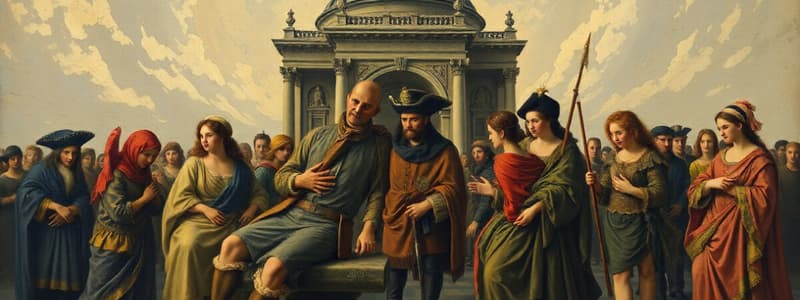Podcast
Questions and Answers
What aspect of the actor's voice contributes to the perception of characters as eternal figures?
What aspect of the actor's voice contributes to the perception of characters as eternal figures?
- The repetition of scenes and nostalgia evoked (correct)
- The volume and clarity of the delivery
- The improvisation skills of the actor
- The costumes and makeup used in performances
What is emphasized more than exact historical fidelity in the representation of historical narratives?
What is emphasized more than exact historical fidelity in the representation of historical narratives?
- The decorations and settings of the performances
- The intent behind the representation (correct)
- The length of the narrative and character development
- The audience's familiarity with the historical context
How do modern-day stories maintain their emotional impact in theater?
How do modern-day stories maintain their emotional impact in theater?
- By focusing solely on factual accuracy
- By restricting narratives to a single culture
- By aligning with the same themes found in ancient myths (correct)
- By losing the historical context altogether
How are the historical events represented in theater typically supplemented?
How are the historical events represented in theater typically supplemented?
What significance do the words in theatrical representations hold?
What significance do the words in theatrical representations hold?
Flashcards
Actor's voice in theater
Actor's voice in theater
The actor's voice, through repetition, evokes the historical subject's voice and creates an eternal character, even if the words change.
Historical representation in theater
Historical representation in theater
Theatrical storytelling doesn't need to be precisely historical but portrays historical events in a meaningful way, sometimes combining multiple different stories.
Historical narratives (theater)
Historical narratives (theater)
Theatrical productions (often from the past) use stories, events, and facts from history, but prioritize emotional impact and intent over literal accuracy.
Modern influences in theater
Modern influences in theater
Signup and view all the flashcards
Example of re-interpretation
Example of re-interpretation
Signup and view all the flashcards
Study Notes
Voice in Parliament
- Voice in parliament is an extended voice
- The voice is no longer the same as the person it represents
- The words spoken are different from the person
- The words are filled with beauty and impact
- Circumstances around the words affect how they are perceived
Power of Representation
- History is represented by narratives
- Historical accuracy isn't important; the intention is
- Details may be added, removed, or changed
- History can be composed of different pieces
- The representation of the story should be modified
Representation of History
- Myths are used for representation of the ancient history
- Real historical events are used as representations instead of myths
- Real historical events have similar traits to old myths
- Recent times use adaptations to represent history
- Adaptations are based on real emotions and situations
Studying That Suits You
Use AI to generate personalized quizzes and flashcards to suit your learning preferences.



